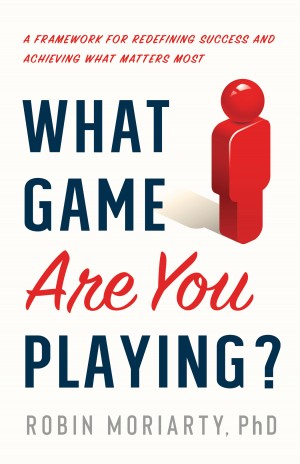
Imagine Your Life Without a Timeline: How to Succeed on Your Own Terms

Many people have told me that they feel “behind” in life because they’re failing to meet their timelines — those life plans with milestones we all feel like we are supposed to achieve within defined time frames. These milestones and timelines are actually externally imposed, yet we internalize them so thoroughly that we feel like failures when we’re not on track with them.
And so, I started wondering what life would look like without a timeline. Here are some ways to think about it, excerpted from my forthcoming book, What Game Are You Playing?.
***
When you’re creating your game, first and foremost, ditch the timeline, whether it’s imposed by you or by someone else. Measuring yourself against an externally imposed timeline is the best way to let life pass you by. Also, when you’ve set a timeline for yourself, whenever the unexpected happens and throws you off track — whether it’s fun and surprise and opportunity or loss and struggle — you feel like a loser because you didn’t hit a milestone by a specific date. Take the pressure off by removing the timeline.
This is really difficult for most people because we are taught to think in terms of timelines. Get a driver’s license at 16, finish high school at 18, and finish college at 22. Then our timelines tell us by what age we should get a job and an apartment, buy a car, be in a serious relationship, get married, have kids, reach management and leadership levels at work, hit financial goals, buy a home, and do all of those other things we think we’re supposed to be doing.
When I spoke with a colleague about this one day, she really freaked out. She said she couldn’t even imagine a life game without a timeline, and she asked me what that would even look like because it was so far-fetched for her. I responded that it means you know, no matter what age you are, you’ll have opportunities to love and be loved in all sorts of ways by all sorts of people. (My experience is love rarely comes in the form I expect it to come in, but I have learned to embrace it nonetheless.)
It means you can get married in your 20s, 30s, 40s — or even your 80s. Some people get married once, some marry multiple times, and some not at all.
It means you can have kids over a range of 20-30 years of your adult life — or not at all. People have children through adoption, with a partner, or with the help of medical intervention. They can parent their children alone, with partners, and with extended support groups. People who have become parents at various ages and under varying circumstances have led happy lives and have great kids. The idea of an optimal age to have kids is an externally imposed one that you don’t have to internalize or follow.
It means that you work on financial goals every single day and that living within your means is the best way to achieve them. As such, making decisions about renting versus buying a home or building a financial cushion aren’t part of a timeline but rather part of your everyday job to take care of yourself — just like eating well, going to the gym, and sleeping.
 It means finding work that fits into the rest of your life, working hard, and contributing to your organization. It means knowing that if your work and value aren’t being appreciated, or that your work situation just isn’t fitting with the rest of what you want to be doing in your life, you can find another situation. Hitting a management or a vice-president level by a certain age is less important than contributing, being valued, and having interesting work.
It means finding work that fits into the rest of your life, working hard, and contributing to your organization. It means knowing that if your work and value aren’t being appreciated, or that your work situation just isn’t fitting with the rest of what you want to be doing in your life, you can find another situation. Hitting a management or a vice-president level by a certain age is less important than contributing, being valued, and having interesting work.
Our timelines are built around others’ expectations, so try to imagine designing your life around the things that are most important to you instead. Imagine that you focus on living life with joy and growth regardless of the timing. Imagine not feeling “behind” because you know you are playing your own game — not someone else’s.
Get focused on where you want to grow and have experiences, like learning a language, or traveling to new places, or learning to code or to cultivate a vegetable garden or to dance or to laugh or to challenge yourself intellectually or at work with new assignments or to write a screenplay. These can be things that enhance your life both personally and professionally, because those two worlds actually go together in that the ways you want to grow personally also may help you grow professionally.
Then, get focused on the kinds of people you want to do all of this with. Not specific names, but qualities of people — those who are supportive of you, accept you for who you are, and will accompany you in your pursuit of joy and growth. Then go find more of these people and surround yourself with them.
Yes, we all have to pay our bills. Get focused on what that equation looks like, too — but only after you’ve thought about where your joy comes from, what kinds of growth you are seeking, and what kinds of relationships you want to invite into your life. Fund those things first, and then think about how big your house needs to be and what brands of clothes you want to buy.
Finally, don’t compare yourself to others when you’re trying to figure out if your life is going the way it needs to go. You’re living your life. Other people are living theirs. Comparisons aren’t valid because you’re apples and they’re oranges. You can both be awesome and both be winning your own games at the same time.
Instead, stay focused on what is right for you. Let the external pressure to measure up to others fall away. It’s harder than it sounds, but remember that your life is not about playing someone else’s game, so don’t measure yourself by their rules and standards of success. Design, play, and win at your own game instead.
Adapted from What Game Are You Playing?: A Framework for Redefining Success and Achieving What Matters Most, available on September 10, 2019.
Robin Moriarty, PhD, is a global business executive, speaker, author, adjunct professor, and thought leader for businesses and nonprofit organizations. Connect with Robin at www.gutsy.world.
<!–
–> <!–